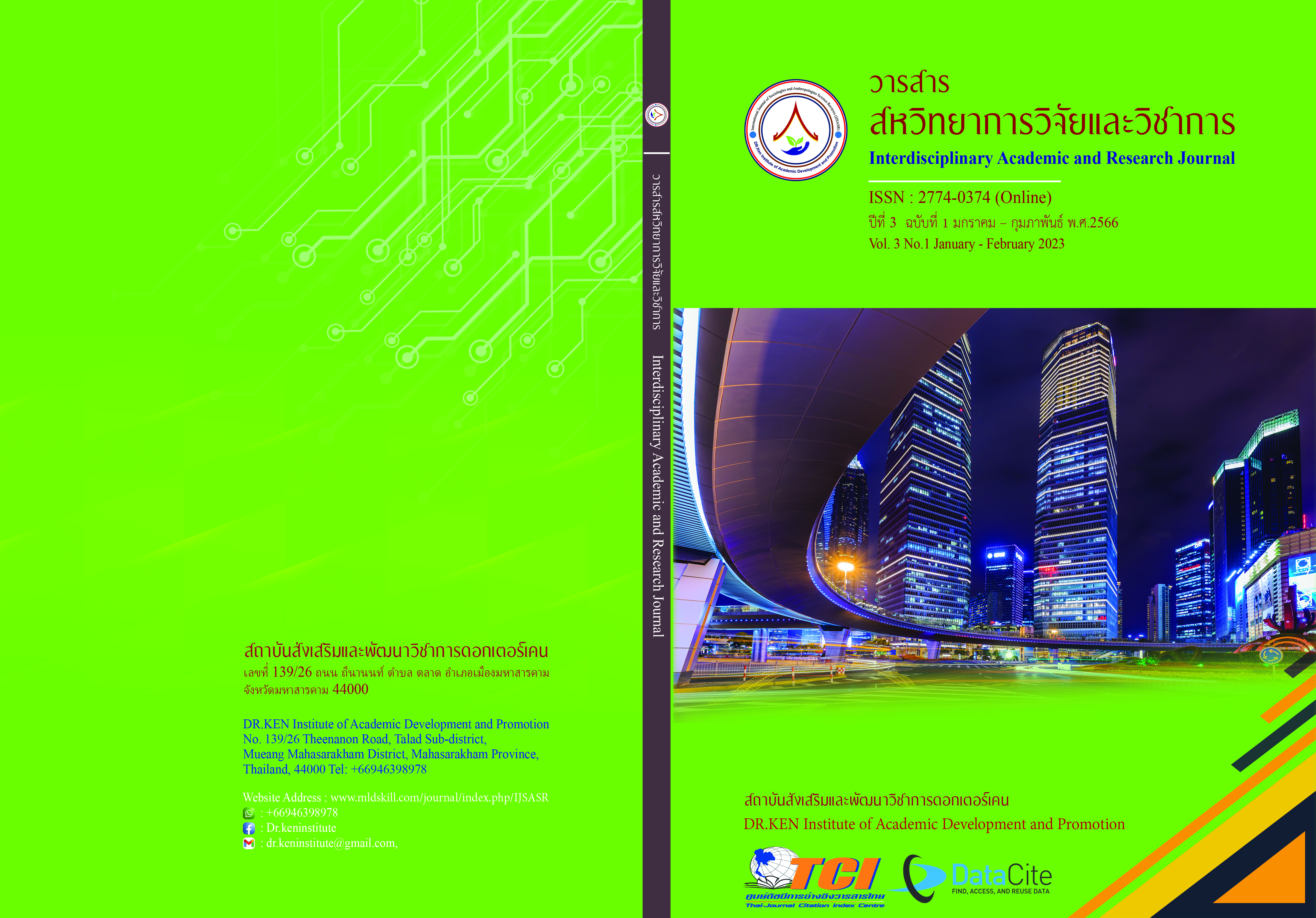Strategic Leadership in the 21st Century of Vocational School Administrators in Chonburi Province Under the Office of the Vocational Education Commission
DOI:
https://doi.org/10.14456/iarj.2023.27Keywords:
Strategic Leadership; , 21st Century Strategy; , Administrators of Vocational Education InstitutionsAbstract
Education in the 21st century is an era of change in which the currents of change affect planning and setting guidelines for national development. The school administrators are the most influential personnel in school administration. Modern administrators must lead change, have strategic leadership, and lead reform according to the Education Act. Therefore, this research aims to (1) study the level of strategic leadership in the 21st century of school administrators. And (2) a comparison of the strategic leadership in the 2st century of vocational school administrators classified by age, education level, and work experience. The population of this research consisted of 916 vocational teachers in Chonburi province. A sample of 274 people. The statistics used for analysis were frequency, percentage, mean, standard deviation, t-test (Independent Samples), F-test (One Way ANOVA). The results showed that; (1) The overall level of strategic leadership in the 21st century of vocational school administrators was at a high level. When considered individually, it was found that the level of opinions was at a high level in all aspects, with the highest level of opinions being team building, and the lowest being emotional intelligence. (2) The results of the comparative analysis of opinions towards strategic leadership in the 21st century of vocational school administrators were overall and in each aspect classified by age, education level, and overall work experience were not different by statistical significant.
References
กฤติยา ใจหลัก ฟริตช์เจอรัลด์. (2551). ภาวะผู้นำของผู้บริหารสถานศึกษาตามความคิดเห็นของข้าราชการครูในสถานศึกษาขั้นพื้นฐาน สังกัดสำนักงานเขตพื้นที่การศึกษาพังงา. กรุงเทพฯ: มหาวิทยาลัยราชภัฏพระนคร.
ธณิศรา แสนจริง. (2555). ภาวะผู้นําของผู้บริหารสถานศึกษาตามความคิดเห็นของข้าราชการครู สังกัดสํานักงานคณะกรรมการการอาชีวศึกษากรุงเทพมหานคร. วิทยานิพนธ์ครุศาสตรมหาบัณฑิต สาขาการบริหารการศึกษา บัณฑิตวิทยาลัย : มหาวิทยาลัยราชภัฏอุบลราชธานี.
ธีระ รุญเจริญ. (2554). กลยุทธ์การพัฒนาความเป็นบุคคลแห่งการเรียนรู้. กรุงเทพฯ : คุรุสภา.
เนตร์พัณณา ยาวิราช. (2556). การจัดการสมัยใหม่. กรุงเทพฯ: โรงพิมพ์บริษัท -ทริปเพิ้ล กรุ๊ป.
บุญชม ศรีสะอาด. (2556). การวิจัยเบื้องต้น. กรุงเทพฯ: สุวิริยาสาส์น.
ประภาพรรณ รักเกลี้ยง. (2556). หลักทฤษฎีและปฏิบัติการบริหารการศึกษา. พิษณุโลก: บัณฑิตวิทยาลัย มหาวิทยาลัยพิษณุโลก, 76-78.
พนิดา งามขุนทด. (2549). ความคิดเห็นของบุคลากรที่มีต่อภาวะผู้นําและความสามารถในการบริหารจัดการของผู้บริหารสถานศึกษา. วิทยานิพนธ์ครุศาสตรมหาบัณฑิต (การบริหารการศึกษา) : บัณฑิตวิทยาลัย มหาวิทยาลัยราชภัฏบุรีรัมย์.
รังสรรค์ ประเสริฐศรี. (2558). ภาวะผู้นำ. กรุงเทพฯ : ธนธัชการพิมพ์.
วรารักษ์ หนึ่งโชคชัย. (2557). ภาวะผู้นำเชิงกลยุทธ์ของผู้บริหารสถานศึกษาตามการรับรู้ของครูในสถานศึกษาสังกัดองค์การ บริหารส่วนจังหวัดอุดรธานี. วิทยานิพนธ์ศึกษาศาสตรมหาบัณฑิต สาขาวิชาการบริหารการศึกษา บัณฑิตวิทยาลัย: มหาวิทยาลัยขอนแก่น.
ศูนย์เทคโนโลยีสารสนเทศและกําลังคนอาชีวศึกษา. (2564). ข้อมูลบุคลากรกําลังคนอาชีวศึกษา. กรุงเทพฯ: ศูนย์เทคโนโลยีสารสนเทศและกําลังคนอาชีวศึกษา.
สำนักเลขาธิการสภาการศึกษา. (2562). สภาพการจัดการศึกษาเฉพาะทางในประเทศไทย ปี 2562-2563. เอกสารเผยแพร่จากสำนักงานเลขาธิการสภาการศึกษา.
Henry, W. S., & Teryl, J. L. (2013). Strategic Leadership in Schools. Education. 133(3), 350-355.
Krejcie, R.V. & Morgan, D.W. (1970). Determining Sample Size for Research Activities, Journal of education and Psychological Measurement. 30 (3), 607-610.
Downloads
Published
How to Cite
Issue
Section
License
Copyright (c) 2023 Jintana Jindasri

This work is licensed under a Creative Commons Attribution-NonCommercial-NoDerivatives 4.0 International License.
Copyright on any article in the Interdisciplinary Academic and Research Journal is retained by the author(s) under the under the Creative Commons Attribution-NonCommercial-NoDerivatives 4.0 International License. Permission to use text, content, images, etc. of publication. Any user to read, download, copy, distribute, print, search, or link to the full texts of articles, crawl them for indexing, pass them as data to software, or use them for any other lawful purpose. But do not use it for commercial use or with the intent to benefit any business.
















.png)


